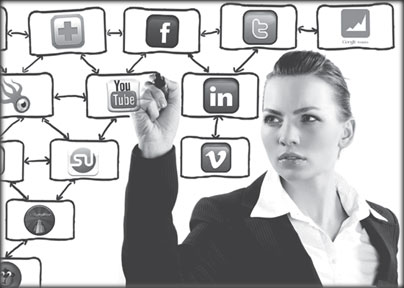Alone or together? The dilemma in social networking
By Lionel Wijesiri
A global survey has revealed that 23 percent of Facebook users check
their accounts five or more times every day. A surprising fact, isnít
it?
It is obvious that social media websites are taking over the Internet
and that new users are signing up every second. Social media sites are
by far some of the fastest growing businesses online. It seems that our
generation cannot get enough of social media and what it has to offer.
No matter how many types of social media sites are out there, new ones
keep appearing and capture our attention.
What makes these sites so popular? What is different about each of
them?
 |
|
There are over 200 well-known social
network sites, each with its pluses and minuses |
The latest recruit in our company, a 22-year-old management trainee,
gave me five good reasons why he uses social media extensively:
* Global connectivity
No matter if you are searching for that former college room-mate,
your first grade teacher, or a foreign friend, there is no easier or
faster way to make a connection than via the social network. Although
Facebook, Twitter, LinkedIn and MySpace are probably the most well-known
social networking communities, there are new websites popping up
regularly that are dedicated to allowing people to connect and to
interact via the Internet.
These connections can help one with a variety of things such as
seeking a new job, locating assistance, getting and giving product and
service referrals, receiving support from like-minded individuals and
making or receiving advice on career or personal issues. In many ways,
social communities are the virtual equivalent of meeting at the mall or
at club socials to exchange news and get updated on friends and
families.
* Common interest
When you opt to participate in a social network community, you can
pick and choose those individuals whose likes and dislikes are similar
to yours and build your network around those commonalities. For
instance, if you are a chess buff or a book lover, you can find and
interact with those who share your interest. Because you are connecting
digitally instead of having to physically attend meetings, you have the
luxury of joining many more groups and communities. You can meet with
your friends any time you have an Internet connection and whenever you
find them online.
* Real-time information sharing
Many social networking sites incorporate an instant messaging
feature, which means you can exchange information in real-time via a
chat. This is a great feature for teachers to use to facilitate
classroom discussions. These networks can be used as effective vehicles
for students to pursue self-paced online learning. In addition, the
Internet is the ultimate online textbook. Students no longer need to
take out six library books at a time. Much of what they need to know can
be found online.
Social networking can provide a tool for managers to use at team
meetings, for conference organisers to use to update attendeesí
knowledge and for business people to use as a means of interacting with
clients or prospects.
* Free advertising
Whether you need to get the word out about your upcoming fund-raiser
or you are a business owner marketing a new product or service, thereís
no better way to get your message to millions of people 24/7. The best
part is that you can spread the word through social networking profiles
free. You can promote one product, service or idea or many because you
are limited only by the amount of time you wish to invest in the
endeavour.
* News cycle speed
Social networking has revolutionised the speed of the news cycle.
Many news organisations now partner with social networking sites such as
Twitter, YouTube and Facebook to collect and share information. One can
get a sense of what is going on in the world just by watching trending
topics from many of these sites. This has led to the development of a
near instantaneous news cycle as millions of social networking updates
rapidly spread news and information.
He is a smart young guy! I told him that I can give five
disadvantages of online social networking:
* Face-to-face connections are endangered
A huge advantage of these social communities has a reverse side
effect that is also a big disadvantage of social networking: They reduce
or eliminate face-to-face socialisation. Because of the anonymity
afforded by the virtual world, individuals are free to create a fantasy
persona and pretend to be someone else. It is hard to say no or be rude,
or ignore someone when you are speaking face-to-face. However, itís
incredibly easy and quick to detach someone or simply block his efforts
to make a connection. Just one click of the mouse and your problems are
over. Unfortunately, this feature of online socialisation cheats people
of the opportunity to learn how to resolve conflicts in the world
outside the Internet and it could retard or cripple oneís social skills
developments.
* Crimes against children
Use of social networks can expose children to harassment or
inappropriate contact from others. Unless the Internet content is
filtered, children could be exposed to pornography or other
inappropriate content.
*Identity theft
Whether you like it or not, the information you post on the Internet
is available to almost anyone who is clever enough to access it. Most
hackers need just a few vital pieces of personal information to make
your life a nightmare, and if they successfully steal your identity, it
could cost you dearly.
* Time waster
 |
|
A young girl networks at a cyber cafe.
Young adults are more likely than older adults to use social
media |
A Nielsen report explains that social networking can be a big waste
of time that sucks 17 percent of our Internet time down the
non-productivity drain. While it is true that some of that time is
likely spent in making and maintaining important business, social or
professional connections, it is also true that it is easy to become
distracted and end up spending valuable time on games, chats or other
non-related activities.
* Invasion of privacy
Social networking invades your privacy and sells your personal
information. Have you ever posted a comment on Facebook, only to notice
an advertisement appear with content related to your post? Facebook has
earned US$ 3.8 billion in revenue in 2011. In 2012, it grew more. Thatís
not bad for a free site. If Facebook and other social networking sites
donít charge their members, how do they make so much money? They do it
by selling the ability to specifically target advertisements.
On social networking sites, the website isnít the product, its users
are. These sites run algorithms that search for keywords, web browsing
habits and other data stored on your computer or social networking
profile and provide you with advertisements targeted specifically at
you. At the same time, you may be giving the site permission to share
your information with outside sources unless you specifically generate
settings that disallow them to do so.
Now we come down to the final point. Are social networks harmful to
society or not?
Because networking in online social communities is still a relatively
young online trend, whether or not social networking is harmful is still
unknown. For safetyís sake, let me give a few hints:
* Like any other type of networking or social club with which
individuals become involved, it is a good idea to do your homework and
make sure that you know what you are getting into;
* Understand the terms of use, the rules and regulations, and be
clear on issues such as security and privacy;
* Take responsibility for your own safety and integrity and never
join something just because it is trendy or all your friends are doing
it.
In evaluating the advantages and disadvantages of social networking,
itís best to err on the side of caution and information. After all, the
lack of both can have a devastating effect.
Technology is threatening to dominate our lives and make us less
human. Under the illusion of allowing us to communicate better, it is
actually isolating us from real human interactions in a cyber-reality
that is a poor imitation of the real world.
This is my personal opinion. While you may or may not disagree with
me strongly, this is absolutely a debate worth having. |



